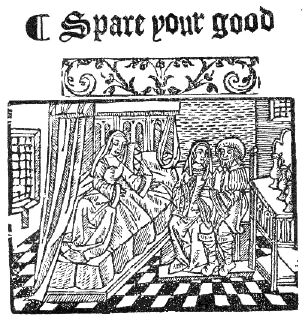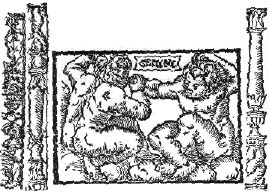 Uen aboute
the moneth of maye,
Uen aboute
the moneth of maye,
I wene it was the thirde
daye
Of that same moneth as I
gesse,
And so it was so haue I
blesse:
For I knowe it well by a
thinge
Of the whiche I haue had
knowledgynge,
As here after ye shall
heare full
well
Of a knightes sone
how it
befell.
A riche knight there was
in Fraunce,
I vnderstande,
And was a man of great
lande
And hyght syr Thomas
perlore:
A son he had with his wyfe
and no
more,
And she was called faire
Ysaungrayne,
And their son called
Rafelyne:
And of this childe ye
shall heare
And of his father and his
mother
dere.
Of his father he was left
and dere,
So was he of his mother I
you ensere.
So it happened vpon a daye
That this yunge man
shoulde sporte
and playe.
His father bade hym go
among wyse
men
That he might learne some
good of
them:
But this yunge man him
bethought
That after his fathers
counsell
he wold do nought:
But to yll company he him
drewe
And learned all vyce and
lefte vertue,
Tyll father and mother
were deade;
Than coulde he none other
rede
But burye them after the
commune
vse,
Other sorowe woulde be
none vse.
But forth he wente to his
company
anone
And saide, sirs let vs be
mery euerychone.
Syr, they saide, welcome
be ye truely
And we all praye you
hartely
To syt by vs and kepe
company.
So he did and thanked them
hartely:
They called anone for
meate &
drincke of the beste
For to eate and drincke as
them
lest;
And whan they had eaten
and dronken
theyr fyll
Syr, they saide, knowe ye
nothinge
of oure wyll?
No, by my faith, he saide
incontinente,
But by saint Thomas of
kente
I woulde haue at the
hasarde a cast
or two,
For to learne to caste the
dyce
to and fro;
And if here be any body
that wyll
for money playe
I haue yet in my purse
money and
pledges gaye.
Some be nobles, some be
crownes
of Fraunce:
Haue at all who wyll of
this daunce.
One of them answered with
that worde
And caste a bale of dyce
on the
borde,
And saide, maister
Rafeleyne wyll
ye haue a fytte?
Haue at all yf ye wyll
sytte.
Maister Rafeleyne drewe to
his pouche
Tyll he had loste coyne
fresshe
and gaye.
Tyll all was gone and
played awaye.
Home he goeth lyke as he
were out
of his minde
And solde al his goodes
before and
behynde;
And to harlotes he goeth
and to
baudes bolde,
For he thought his money
shoulde
euer holde.
To the tauerne and to the
bordell
he him drest,
For al that his felowship
did counsel
him for the best.
But at the laste whan all
was gone
Than he began to make his
mone,
Like as here after ye shal
vnderstande:
Therefore spare your good
that ye
haue in hande.
Thus endeth the prologue.
 Las my good
is spente: I haue no more,
Las my good
is spente: I haue no more,
Therfore I am troubled
sore,
With great greuaunce in my
herte
rote
To spende a pounde was but
a small
note,
Lyke as I was vsed to do
here and
ther
Therfore I must now mirth
forbeare;
Whyche here before I did
not vnderstande:
Therfore spare your good
that ye
haue in hande.
What shall I now begin to do alace,
Here before I might go in
euery
place
Wyth the best where so
euer they
wente
Vnto the wine, to the good
ale,
or to the bere al unshent.
But for bycause gyue no
more I maye
Muste I be cast out of al
game and
play.
In my greuaunce is no
remedy, I
vnderstand:
Therfor spare your good
that ye
haue in hande.
What auayleth it me to crye or to
complayne then
Whan my frendes and also
my kynnesmen
Maie neither se me nor
heare me?
Therfore thincke I of them
but lytell
comforted to be.
Thus haue I spente al my
good out
right
Wyth playenge, wyth
drinkynge day
and night;
Which euery wise man will
not do,
I vnderstande:
Therfore spare your good
that ye
haue in hand.
Neuer I coulde perceyue this great
charge
But my luste hath brought
me in
this rage;
The whiche I begin now to
vnderstand
That money is lorde of all
the lande;
For bycause I haue not
hadde this
in remembraunce,
Therfore pouertie and
miserye is
fall to my chaunce,
And am taken of no value,
I vnderstande:
Therfor spare your good
that ye
haue in hande.
I see that they with fingers point
after me
The whyche here before
were vsed
to prayse me;
And they let me passe by
the dore
Te whiche I haue kepte
good felowshippe
to fore;
They mocke with me whiche
I was
wonte to truste;
May not I haue great
repentaunce
of this luste?
Ye, and must suffre this,
I vnderstande:
Therfor spare your good
that ye
haue in hande.
Whan I was yonge and had good at
wyll
And euery body eate and
drancke
with me their fyll,
Than they did cal me in
euery place;
Now they thincke I am not
worth
a lace.
Pouertye hath taken me
with great
sorow;
I haue nothinge nor can
nothinge
borow;
Thus haue I but yll
fortune, I vnderstande;
Therfore spare your good
that ye
haue in hand.
I haue thought in my minde,
Coulde I any good get or
find,
I would not caste it away
euery
dele,
Lyke as my fellowshippe
did my counsel.
Whan I was vsed to beare
money be
my syde
I thought not that it
shoulde thus
from me slyde;
Thus was I not wyse, I
vnderstande:
Therfore spare your good
that you
haue in hande.
Might I yet that daye liue
That my frendes woulde me
giue
Some thinge where with all
I might get richesse and
honeste
princypall,
I woulde thanke them nowe
and than
amonge;
But certes my thinketh
they tary
to longe.
Therfore I must suffer be
it swete
or soure, I understand:
Therfore spare your good
that ye
haue in hand.
Whan any body hath any richesse
Euery body him worshippeth
both
more and lesse,
But and he haue nothinge
in value
He is nothinge sette by,
perdue.
And if he come hyther or
els where
Euerie body fleeth from
him as he
the deuyll were.
Ful often chaungeth his
courage,
I vnderstande:
Therfor spare your good
that ye
haue in hande.
He that hath nothinge is taken of
no value,
And wyll not do after good
counsell,
perdue;
Lyke as of me ye maye
example take,
Howe of ryot and other
games was
vsed to make
Who so euer in the worlde
yf ryot
me bethought
I coulde it lyghtly helpe
for to
be wrought.
Whiche is now bitter, it
was than
swete at that stand:
Therfor spare your good
that ye
haue in hande.
Wherfore sholde not I take now sorowe
againe?
Ye, certes, there is none
that wyl
me any thing lene;
Euen thus the whele of
fortune renneth,
And if good lucke or yll
happe,
It commeth to him that
shall haue
it at a clappe.
Euery body maie se by me
in this
stande:
Therfor spare your good
that ye
haue in hande.
A man maye well a good felow be
In the wine, in good ale,
in bere
where so it be;
And yf he thinke for the
commune
profyte also,
Here or there where so
euer he go,
Thus may a man haunte
mirth and
game,
If he do it not by measure
he is
to blame;
For in euery thinge
measure is good,
I vnderstand:
Therfor spare your good
that ye
haue in hand.
Farewell, I sette you al this testamente,
Who wyll learne this shall
be vnshente,
And can kepe him amonge
good company,
Shall be fre of al sorowe
and myserye.
Who so euer taketh this
testamente
in remembraunce,
Pouertye and myserye shall
not fall
to his chaunce.
Hys good, his worshippe
shall he
kepe, I vnderstande:
Therfor spare your good
that ye
haue in hande.
![[Renascence Editions]](http://www.luminarium.org/renascence-editions/gifs/ren.gif)

 Uen aboute
the moneth of maye,
Uen aboute
the moneth of maye,  Las my good
is spente: I haue no more,
Las my good
is spente: I haue no more, 